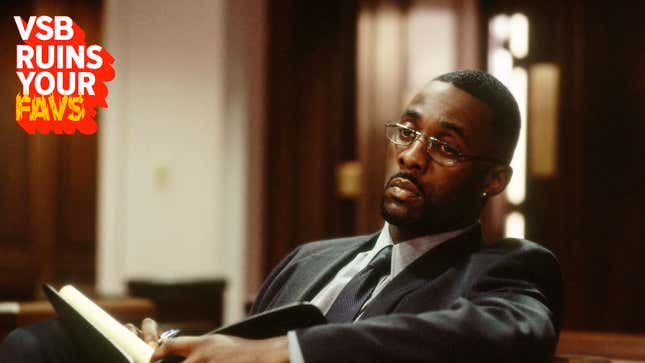
Welcome to VSB Ruins Your Favs, a series where we’ll take a look at some of the most beloved parts of our culture—movies, cities, television characters, people, foods, decades, etc.—and ruin them for you. You’re welcome.
I began watching The Wire in 2003, on the strength of a recommendation from my cousin (a cop in Washington, D.C.) who shared that it was the most nuanced and realistic depiction of his life he’d ever seen. Season Three hadn’t aired yet, so I had time to go back and watch the first two seasons—and I was immediately hooked.
Among the many now-iconic characters from those first three seasons—Omar Little, Bubbles, Avon Barksdale, Bodie Broadus, Jimmy McNulty, etc—Idris Elba’s Russell “Stringer” Bell stood apart. Although The Wire had a sprawling ensemble cast, it was largely built around his position, his power, his decisions, and his fall. And Stringer’s influence stretched well beyond the show, as that character became the visual archetype for the quasi-mythical “educated thug” who ran the block and the boardroom. This status was largely due to Elba’s star-making performance, as he possessed a presence and a smoldering charisma that leaped off the screen. He was (and still is) one of the few people who, if your partner has a thing for him, leaves you thinking “Yeah...I get it” and impressed with their taste.
Unfortunately—for fans of this character, and for the Barksdale crime family—that status is woefully undeserved. On repeated viewings of the series, it becomes apparent that The Wire is just a chronicle of increasingly bad (and dumb!) decisions that Stringer Bell made. If he was a better number two, the Barksdales might still be running West Baltimore today instead of selling Prepaid Legal in PG county barbershops.
There were too many terrible decisions to list them all here, so I’ll just focus on one from each season.
1. The torture and mutilation of Brandon
Omar’s partner-in-crime (and in bed), Brandon met a very unfortunate end when members of the Barksdale crew caught him slipping at a restaurant, kidnapped him, and killed him. Although String didn’t commit any violence himself, he arranged it and oversaw the torture.
Brandon’s murder was, well, part of the game. If you make a living robbing drug dealers, death is an occupational hazard. Omar understood this, but what inspired his specific vendetta against the Barksdales—a grudge that eventually led to Stringer’s death—was the torture. They didn’t have to go there, and they only went there because of Stringer’s overcompensation. Why so insecure, String?
2. Going against Avon to run Brother Mouzone out of Baltimore
A recurring theme in those first three seasons was the growing tension between String and Avon. String wanted to give their business a legitimacy—or, rather, a veneer of legitimacy—while Avon’s focus was narrower.
When first viewing the show, String feels like the one with the best argument and most deserving of our sympathy. Who wouldn’t want to remove the violence from that game, since that’s what causes feuds and attracts the police? But Avon knew that was both impossible and silly. The threat of violence was necessary to control and regulate that unregulated (and lucrative!) business. And even if they weren’t actively at war, they needed enough territory to put the fear of God into anyone who’d challenge them.
Of Stringer’s bad decisions, what happened with Brother Mouzone might have been his worst. (And dumbest!) Recruited by Avon to provide necessary muscle, String believes Mouzone’s presence is hurting the business, and concocts a story blaming him for Brandon’s death; a lie that puts a battery in Omar’s back and makes a rival crew (Prop Joe’s) stronger.
Of course, this plan backfires as both Omar and Mouzone soon realize they’re being played by Stringer, and they eventually have a meeting with him to, um, discuss things.
3. Getting played by Clay Davis
The Wire did an excellent job of lathering String with intelligence markers. He was tall, handsome, mild-mannered, and articulate. He dressed like a Bachrach mannequin and took community college courses. He instituted Robert’s Rules of Order and said things like “yo’ and “motherfucker” with rigor. But, as Bomani Jones articulated in a thread about him last week, this was merely the sort of “smart” presentation that fools people. We see someone who possesses that, and we presume a savvy that ain’t always there.
In Stringer’s case, this presentation shielded the reality that he was actually a simpleton. Perhaps even dumb.
I can’t think of another television character who embodied “I wouldn’t trust him as far as I can spit” better than Clay Davis did. Everything about him—his clothes, his demeanor, his words, his smile—screamed “This nigga’s a con!” Of course, confidence men are who they are because they’re gifted at grift and shameless with it, but anyone as street- and book- smart as String was supposed to be would’ve sniffed that shit out. Instead, he was played —for years!—by a man my four-year-old daughter wouldn’t trust to blow a bubble.
In summary, The Wire’s depiction of him was smart—as was Idris Elba’s performance. But Stringer Bell was dumb as rocks.
(Updated 3/3/22 with new details)

